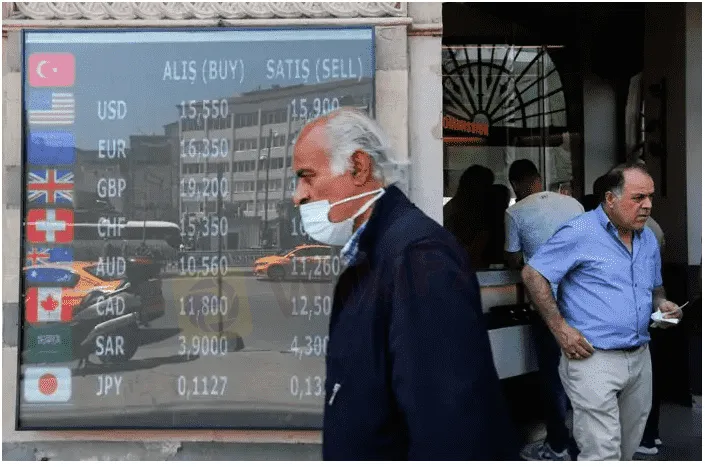简体中文
繁體中文
English
Pусский
日本語
ภาษาไทย
Tiếng Việt
Bahasa Indonesia
Español
हिन्दी
Filippiiniläinen
Français
Deutsch
Português
Türkçe
한국어
العربية
Turkish lira on slow slide in search of FX relief
요약: The Turkish lira slipped again on Monday, sustaining a slow slide towards 18 against the dollar as concerns mounted about the government’s foreign exchange policy in the face of surging inflation and fears of global recession.

The slow depreciation could continue unless authorities find a new source of foreign funds to buffer depleted official reserves, analysts say. Adding to uncertainty over coming weeks, corporate depositors will decide whether to largely stick with special state-backed lira-protected accounts.
The lira weakened as much as 0.4% to 17.8335 against the U.S. currency, trading at its weakest levels since a full-blown currency crisis in December, when it hit an all-time low of 18.4.
“We are seeing the lira losing limited value each day with the current policy. The balance in forex can only be achieved with the lira losing value, albeit limited,” said a treasury desk trader at one bank.
The lira has steadily weakened 6.3% this month.
The Turkish Central Bank‘s quarterly inflation report on Thursday and the U.S. Federal Reserve’s expected 75 basis-point interest rate hike on Wednesday were set to be key focuses of attention for investors this week.
On Thursday the Turkish central bank is expected to again raise its end-year inflation forecast from 42.8% previously. According to a Reuters poll, annual inflation is expected to be 70% by end-2022. It hit a 24-year high near 80% last month.
The rampant inflation was triggered by a series of unorthodox interest rate cuts which knocked 44% off the liras value last year. It has weakened another 26% this year.
Despite the unrelenting depreciation, the central bank is expected to keep its policy rate steady at 14% for at least another year, focusing instead on macro-prudential measures on loans and liquidity.
The central banks net forex reserves have tumbled to just over $6 billion this month, the lowest levels since 2002, with bankers calculating forex reserves excluding swaps to be minus $55 billion.
The treasury desk trader said a big question is whether new foreign forex resources will flow into Turkey, given the need for fresh resources is at unprecedented levels.
Authorities sought to stem the liras decline from the end of last year with special bank accounts, dubbed KKM, protecting savers and corporates from large lira falls to discourage hoarding of U.S. dollars, euros or gold.
“Markets are monitoring the rollover of corporates KKMs which begin this week and intensify over 3-5 weeks. We have not yet seen heavy forex demand due to KKM. But the issue of whether KKM rollovers will create forex demand will be important for the course of the lira,” the trader said.

면책 성명:
본 기사의 견해는 저자의 개인적 견해일 뿐이며 본 플랫폼은 투자 권고를 하지 않습니다. 본 플랫폼은 기사 내 정보의 정확성, 완전성, 적시성을 보장하지 않으며, 개인의 기사 내 정보에 의한 손실에 대해 책임을 지지 않습니다.
WikiFX 브로커
최신 뉴스
벚꽃 앱테크 이벤트 당첨자 발표
[4월 2일 거래 팁] 美 관세 발표 임박,‘불확실성 장세’에서 살아남는 법은?
환율 계산기


